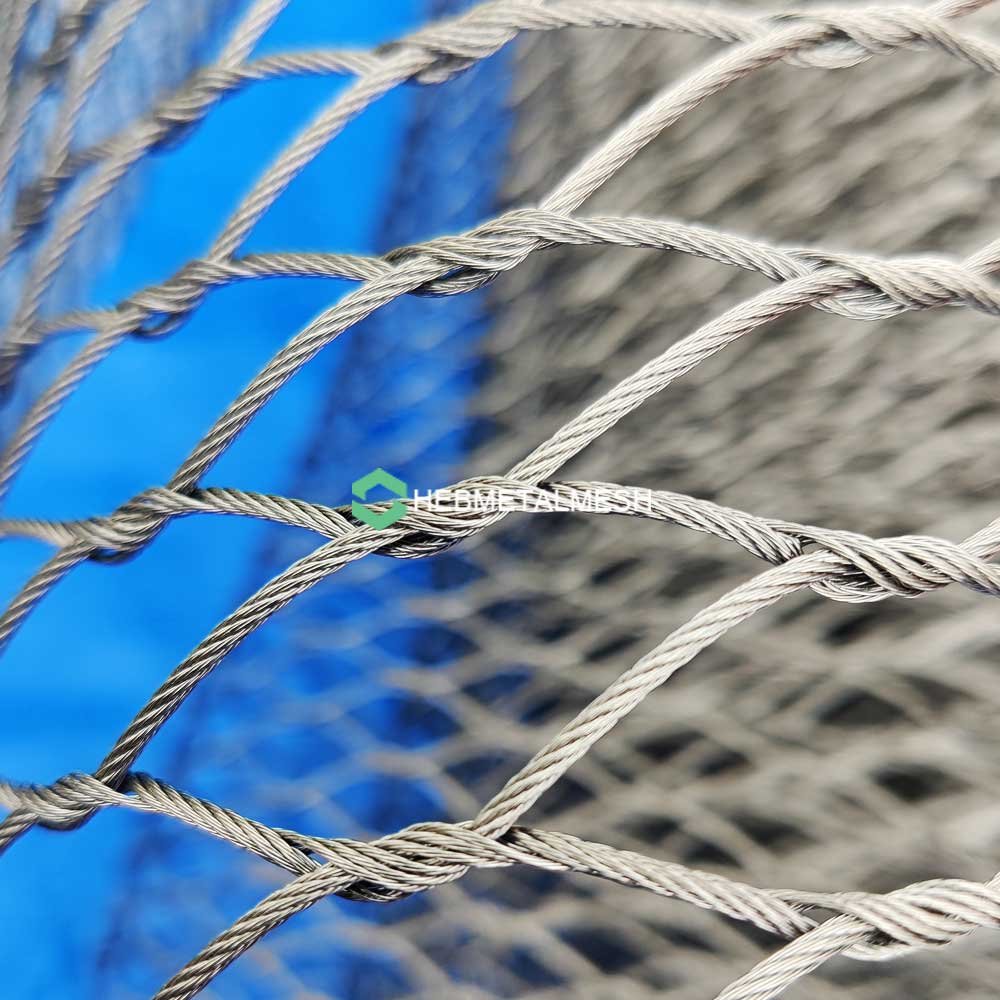Introduction to Stainless Steel Mesh Wire
Stainless steel mesh wire is a versatile material widely utilized across various industries due to its strength, corrosion resistance, and aesthetic appeal. Composed primarily of iron, chromium, and nickel, stainless steel develops a thin layer of oxide on its surface when exposed to air, which protects it from rust and oxidation. This unique characteristic makes stainless steel mesh wire particularly suitable for applications where durability and maintenance are critical.
The history of stainless steel dates back to the early 20th century, with the invention of the alloy attributed to Harry Brearley in 1913. Since then, stainless steel has undergone numerous developments, leading to the creation of different grades and alloys, each designated for specific applications. Stainless steel mesh wire, in particular, has become a staple in various sectors such as construction, food processing, manufacturing, and even in residential homes for decorative purposes.
Common applications of stainless steel mesh wire include filtration systems where it is used to create screens that separate contaminants from liquids and gases. It is also employed in architectural designs, providing both structural support and design elements. In the agricultural sector, stainless steel mesh wire is used for fencing and crop protection, reflecting its adaptability across diverse fields. The material’s ability to withstand high temperatures and its resistance to various chemicals also add to its appeal, making it an essential choice for industrial processes.
Furthermore, stainless steel mesh wire is valued for its ease of fabrication, allowing it to be shaped and molded into different forms and sizes to meet specific needs. This adaptability, combined with its long lifespan and minimal maintenance requirements, underscores the significance of stainless steel mesh wire in modern industry and daily life.
Types of Stainless Steel Mesh Wire
Stainless steel mesh wire comes in various types, categorized notably by weave patterns, gauge sizes, and the grades of stainless steel used. Understanding these classifications aids consumers in selecting the most appropriate mesh for specific applications.
One of the fundamental distinctions lies in the weave patterns: the primary categories are woven and welded mesh. Woven stainless steel mesh wire is created by interlacing strands of wire in a crisscross pattern, creating openings of varying sizes. This type of mesh is renowned for its flexibility and strength, making it ideal for applications that require a degree of pliability. In contrast, welded stainless steel mesh offers superior rigidity, as each wire is welded at the intersection points. This type is commonly used in construction, as it provides a robust barrier or structural support. The choice between woven and welded mesh will depend on the specific requirements of the application.
Gauge sizes, which refer to the thickness of the wire, also play a critical role in the selection process. Stainless steel mesh wire is available in a range of gauges; thinner wires might be suitable for filtration purposes, while thicker wires can withstand more significant strain, making them ideal for supporting heavy loads. Ensuring the correct gauge is essential for achieving optimal performance in any given context.
Lastly, the grade of stainless steel utilized significantly affects the mesh’s properties and resistance to corrosion and other environmental factors. Common grades include 304 and 316, with 316 offering enhanced corrosion resistance due to its higher molybdenum content, making it favorable for marine or chemical applications. Recognizing the nuances between these various types of stainless steel mesh wire can facilitate better decision-making for any project, ensuring that the chosen mesh meets the specific demands of its intended use.
Key Properties of Stainless Steel Mesh Wire
Stainless steel mesh wire is widely recognized for its exceptional properties, which make it a highly sought-after material in various industries. One of the primary characteristics of stainless steel is its superior corrosion resistance. This property is attributed to the presence of chromium, which forms a passive layer of chromium oxide on the surface. This oxide coating prevents rust and degradation, allowing stainless steel mesh wire to perform well in adverse environmental conditions such as moisture and chemical exposure.
Another essential quality of stainless steel mesh wire is its high tensile strength. This strength ensures that the mesh can withstand significant stress and strain without losing its structural integrity. It is particularly beneficial in applications requiring robust support, such as construction, filtration, and safety barriers. The ability to maintain dimensions and form in challenging conditions further underscores its reliability and performance in demanding environments.
Durability is another key property that enhances the appeal of stainless steel mesh wire. This material is engineered to resist wear and tear over time, proving advantageous for long-term applications. The inherent strength and resistance to impactful forces mean that stainless steel mesh wire will not easily deform or break under pressure, thus reducing the need for frequent replacements.
In addition to its practical benefits, stainless steel mesh wire also offers aesthetic appeal. Its clean, sleek appearance can enhance the design of structures and products, making it a popular choice in architectural applications. The versatility of stainless steel mesh wire allows designers to incorporate it into various projects while benefiting from its functional capabilities. All these properties contribute to the widespread usage of stainless steel mesh wire in numerous sectors, including construction, automotive, food processing, and more.
Applications of Stainless Steel Mesh Wire
Stainless steel mesh wire is a highly versatile material, utilized across a variety of industries due to its exceptional strength, durability, and resistance to corrosion. One of the primary sectors leveraging this material is construction, where stainless steel mesh wire is employed in concrete reinforcement, providing structural integrity and longevity. Its ability to withstand heavy loads and environmental stressors makes it an ideal choice for architectural applications, such as facades and railings.
In the automotive industry, stainless steel mesh wire plays a critical role in manufacturing components that require both lightness and resilience. This includes the production of filters, screens, and protective grilles, where the properties of stainless steel ensure enhanced safety and performance. For instance, a leading automobile manufacturer has successfully implemented stainless steel mesh wire in their vehicles’ braking systems, resulting in improved longevity and functionality.
The food processing sector is another prominent application area, where stainless steel mesh wire is vital for hygienic food handling and production. It is utilized in various equipment, including conveyor belts and safety screens, to facilitate food safety. This material meets stringent health standards and is easy to clean, preventing contamination during the processing phases. A notable example includes its use in the dairy industry, where stainless steel filters and sieves ensure that milk products maintain their quality throughout manufacturing.
Aerospace applications also benefit from the exceptional properties of stainless steel mesh wire; its lightweight and strong characteristics contribute to the manufacturing of various components, including structural reinforcements in aircraft. The aerospace industry prioritizes materials that sustain extreme conditions while also being reliable, which is why stainless steel mesh wire is a preferred option for part fabrication.
Overall, the adaptability of stainless steel mesh wire across various industries showcases its practicality and efficacy in applications ranging from construction to food processing. The continuous integration of this robust material into diverse fields underscores its significance in modern manufacturing processes.
Benefits of Using Stainless Steel Mesh Wire
Stainless steel mesh wire has established itself as a preferred choice across various industries due to its multifaceted benefits that significantly outweigh those of other materials. One notable advantage is its cost-effectiveness over time. Although the initial investment for stainless steel products may be higher than alternative options like plastic or galvanized metal, their durability and longevity lead to reduced replacement and maintenance costs. Stainless steel mesh wire maintains structural integrity even under heavy use, making it a financially prudent decision in the long run.
Another key benefit is the low maintenance requirement associated with stainless steel mesh wire. Unlike other materials, which may require regular treatment or replacement due to corrosion or damage, stainless steel shows considerable resilience to wear and tear. Its non-porous surface does not support bacteria growth, thus lowering maintenance efforts and making it an ideal choice for applications in food processing and medical equipment where hygiene is critical.
Additionally, resistance to environmental factors is a crucial aspect of stainless steel mesh wire. The material is highly resistant to rusting, oxidation, and corrosion, ensuring its functionality in various weather conditions. This durability allows it to be utilized in outdoor applications without the risk of degradation over time. Consequently, it is commonly preferred for construction purposes, landscaping, and even in marine environments.
Lastly, eco-friendliness stands out as a significant advantage of utilizing stainless steel mesh wire. This material is 100% recyclable, which aligns with sustainable practices and helps reduce environmental impact. Unlike plastic alternatives, which contribute to pollution and waste, stainless steel products can be repurposed and reused, thus promoting a circular economy. Overall, the numerous advantages of stainless steel mesh wire highlight its value and contribute to its growing popularity in various sectors.
Installation and Maintenance Tips
Installing stainless steel mesh wire requires careful planning and execution to ensure optimal performance and longevity. Begin by measuring the area where you intend to install the mesh, making precise calculations to determine the required quantity. Prior to installation, gather all necessary tools such as wire cutters, a measuring tape, fastening hardware, and a suitable safety gear including gloves and goggles to protect yourself during the process.
Start with cleaning the surface where the mesh will be installed, removing any debris or obstacles that could hinder a secure installation. Next, cut the stainless steel mesh wire to the desired dimensions, ensuring that the edges are smooth to avoid injury. Position the mesh against the intended surface and secure it using the appropriate fastening methods. Common options include staples, screws, or U-clips that are resistant to corrosion. For added security, consider overlapping the edges of the mesh and fastening them together, especially in areas that experience high tension or movement.
The maintenance of stainless steel mesh wire is equally important to ensure its longevity. Regular inspections should be conducted to check for any signs of wear or corrosion. Clean the mesh periodically using a mild detergent and water, which helps in removing dirt and grime that can accumulate over time. For more stubborn stains, a non-abrasive cleaner or a soft brush can be utilized. It is essential to avoid using harsh chemicals or abrasive materials, which can damage the surface of the stainless steel and compromise its protective layer. Lastly, store any sections of the mesh in a dry place to prevent exposure to moisture when they are not in use.
Safety Considerations for Using Stainless Steel Mesh Wire
When working with stainless steel mesh wire, prioritizing safety is essential to prevent accidents and ensure effective handling. Stainless steel mesh wire is often utilized in various applications, including construction, automotive, and industrial settings. Therefore, understanding the necessary safety measures is crucial for anyone engaging with this material.
The first consideration is proper protective equipment (PPE). Individuals should wear gloves to avoid cuts and abrasions when handling stainless steel mesh wire. Sharp edges can pose significant risks, especially during the cutting or installation processes. Additionally, safety goggles are recommended to protect the eyes from fragments or sharp splinters that may become dislodged during work with the mesh.
Moreover, using the correct cutting tools is vital. Stainless steel mesh wire can be tough, requiring professional-grade wire cutters or metal snips to ensure clean cuts while minimizing the risk of the tools slipping, which can lead to injury. It is advisable to make cuts on a flat, stable surface to maintain control during the cutting process.
When incorporating stainless steel mesh wire into projects, secure the mesh properly to prevent any shifting that may cause instability. Whether the mesh is being used for fencing, screens, or other applications, ensure that it is adequately fastened with appropriate hardware. Failure to do so can lead to accidents or damage to surrounding areas.
Finally, always be aware of the environment in which you are working. Ensure that the workspace is clear of clutter to minimize trip hazards, and employ caution when using power tools. A clear understanding of safety protocols will enhance the effective use of stainless steel mesh wire while mitigating potential risks associated with its handling and application.
Comparison with Other Wire Materials
When evaluating the suitability of various wire materials for specific applications, it is essential to consider properties such as durability, corrosion resistance, and flexibility. Stainless steel mesh wire stands out against alternatives like aluminum and plastic mesh due to its unique characteristics. One of the most significant advantages of stainless steel wire is its exceptional strength and toughness. It can withstand high tensile stresses and resist breaking or deforming under pressure, making it ideal for structural applications.
In contrast, aluminum mesh, while lightweight and resistant to rust, does not offer the same level of strength. This can be a disadvantage in applications requiring high durability and load-bearing capacity. Moreover, aluminum is more prone to deformation and may not withstand harsh environmental conditions as effectively as stainless steel. Therefore, for projects demanding long-term reliability and strength, stainless steel mesh wire is often the better option.
Plastic mesh is another alternative commonly used for various applications due to its resistance to corrosion and moisture. However, plastic mesh lacks the mechanical strength of stainless steel. While it is suitable for lighter tasks and provides flexibility in some cases, its vulnerability to ultraviolet (UV) degradation and temperature fluctuations can limit its longevity. In contrast, stainless steel wire offers superior resistance to environmental factors, making it a more dependable choice for outdoor or industrial applications.
Additionally, when it comes to maintenance, stainless steel requires minimal upkeep, often necessitating only occasional cleaning to maintain its appearance and functionality. This contrasts with plastic meshes, which may require more frequent replacements due to wear and tear. Therefore, for projects that necessitate a combination of robustness, longevity, and low maintenance, stainless steel mesh wire typically presents the most reliable option when compared to aluminum and plastic alternatives.
Conclusion and Future Outlook
In conclusion, stainless steel mesh wire stands out as a remarkable material that combines durability, versatility, and a range of practical applications. Its resistant properties against corrosion and rust, attributed to the stainless steel composition, make it an ideal choice for industries such as construction, automotive, and food processing. With a range of wire gauges and mesh sizes available, stainless steel mesh wire can be tailored to suit various requirements, from filtration systems to architectural elements. Its aesthetic appeal further enhances its utility, allowing it to be used in decorative applications while maintaining structural integrity.
As we look towards the future, the role of stainless steel mesh wire is poised for significant expansion, particularly in fields driven by innovation and technological advancements. The growing demand for sustainable and eco-friendly materials positions stainless steel as a favorable option, given its recyclability and long lifespan. Emerging markets, such as renewable energy, where stainless steel mesh wire can be utilized in filtration or protective applications, are likely to witness increased adoption. Additionally, advancements in materials science could lead to the development of enhanced stainless steel variants, improving performance characteristics and broadening application ranges.
The integration of stainless steel mesh wire into smart materials and technologies heralds exciting possibilities for the future. Developments in electronic applications may introduce new uses where mesh wire serves as a conductive element, further diversifying its existing portfolio. As industries evolve and adapt to new challenges and consumer demands, stainless steel mesh wire will continue to be a pivotal resource. By maintaining its position at the intersection of functionality and innovation, stainless steel mesh wire is likely to secure its relevance for years to come in an increasingly sophisticated marketplace.


